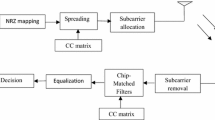Abstract
A novel fuzzy minimum output energy (MOE) detector is proposed for uplink multicarrier CDMA (MC-CDMA) systems with carrier frequency offset (CFO) over multipath fading channels. The proposed receiver involves the following stages. First, the fuzzy CFO constrained MOE detector after coarse CFO estimation is proposed to suppress multiple access interference and combat the degradation problem of the conventional MOE detector caused by the CFO effect. Next, using the signal subspace projection technique, the proposed detector can further reduce the enhanced noise due to the fuzzy CFO constrained detector. Finally, the output data obtained from these detectors are coherently combined to offer multipath diversity gain in accordance with the maximum ratio combining criterion. Furthermore, the proposed single input single output (SISO) robust detector can be easily extended for a multiple input multiple output (MIMO) MC-CDMA system with a high rate of performance. Simulation results show that the proposed SISO detector, which offers a similar performance as the optimal detector, can provide robustness against CFO and outperform the conventional detectors. The proposed MIMO detector with spatial multiplexing gain also exhibits excellent performance.
Similar content being viewed by others
References
Hara S., Prasad R. (1997) Overview of multicarrier CDMA. IEEE Communications Magazine 35(12): 126–133
Chien F. T., Hwang C. H., Kuo C. C. (2006) Performance analysis of multicarrier CDMA systems with frequency offsets and random spreading under optimum combining. IEEE Transactions on Communications 54(4): 737–747
Cheng H., Chan S. C. (2007) Blind linear MMSE receivers for MC-CDMA systems. IEEE Transactions on Circuits Systems Part I 54(2): 367–376
Hara S., Prasad R. (1999) Design and performance of multicarrier CDMA system in frequency-selective Rayleigh fading channels. IEEE Transactions on Vehicular Technology 48(5): 1584–1595
Honig M., Madhow U., Verdu S. (1995) Blind adaptive multiuser detection. IEEE Transactions on Informational Theory 41(7): 944–960
Seo B., Kim H. M. (2002) Frequency offset estimation and multiuser detection for MC-CDMA systems. IEEE MILCOM 2002: 804–807
Pollet T., Van Bladel M., Moeneclaey M. (1995) BER sensitivity of OFDM systems to carrier frequency offset and wiener phase noise. IEEE Transactions on Communications 43(2/3/4): 191–193
Wang X. D., Poor H. V. (1998) Blind multiuser detection: A subspace approach. IEEE Transactions on Informational Theory 44(3): 677–690
Xu Z., Liu P., Wang X. (2004) Blind multiuser detection: From MOE to subspace methods. IEEE Transactions on Signal Process 52(2): 510–524
Lin T. T. (2008) Performance analysis of non-data aided SBIB receivers for CDMA systems. Signal Process 88(6): 1340–1354
Moose P. H. (1994) A technique for orthogonal frequency division multiplexing frequency offset correction. IEEE Transactions on Communications 42: 2908–2914
Foschini G. J., Gans M. J. (1998) On the limits of wireless communications in a fading environment when using multiple antennas. Wireless Personal Communications 6: 315–335
Chang A. C., Shiu J. H. (2007) Enhancement of MCMV capability for multiuser detection under spreading code mismatch. IEICE Transactions on Communications E90-B: 3303–3306
Lin H., Nakao T., Lu W., Yamashita K. (2008) On the estimation of carrier frequency offset and DC offset for OFDM systems. IEICE Transactions on Communications E91-B: 3288–3296
Pedrosa P., Dinis R., Nunes F. (2007) Iterative frequency domain equalization for DQPSK signals. IEEE ISCIT 2007: 808–813
Hughes B. L. (2000) Differential space-time modulation. IEEE Transactions on Informational Theory 46(7): 2567–2578
Lok T. M., Wong T. F., Lehnert J. S. (1999) Blind adaptive signal reception for MC-CDMA systems in Rayleigh-fading channels. IEEE Transactions on Communications 47: 464–471
Lin G. J., Lee T. S. (2003) A decision aided CDMA receiver with partially adaptive decorrelating multi-user interference can collation. Wireless Personal Communications 26: 53–73
Lin T. T. (2007) Development and performance analysis of non-data aided MMSE receiver for DS-CDMA systems. IEICE Transactions on Communications E90-B(7): 1754–1763
Le K. N. (2009) Performance bounds on BER of OFDMA with pulse shaping and maximal ratio combining diversity. European Transactions on Telecommunications 20(5): 487–493
Le K. N. (2010) BER of OFDM in Rayleigh fading environments with selective diversity. Wireless Communications and Mobile Computing 10(2): 306–311
Monsen P. (1977) Theoretical and measured performance of a DFE modem on a fading multipath channel. IEEE Transactions on Communications 25: 1144–1153
Hwang J. K., Chen C. H. (2001) Performance analysis of MIMO-MMSE DFE multiuser receiver for TDMA mobile systems with spatial diversity. IEEE VTC 2001(1): 142–146
Proakis J. G. (2001) Digital communications, 4 edn. McGraw-Hill, New York
Author information
Authors and Affiliations
Corresponding author
Rights and permissions
About this article
Cite this article
Deng, JH., Lin, TT. & Liao, SM. A Fuzzy MOE Receiver for Uplink MC-CDMA Systems with Carrier Frequency Offset over Multipath Fading Channels. Wireless Pers Commun 65, 537–553 (2012). https://doi.org/10.1007/s11277-011-0271-1
Published:
Issue Date:
DOI: https://doi.org/10.1007/s11277-011-0271-1




